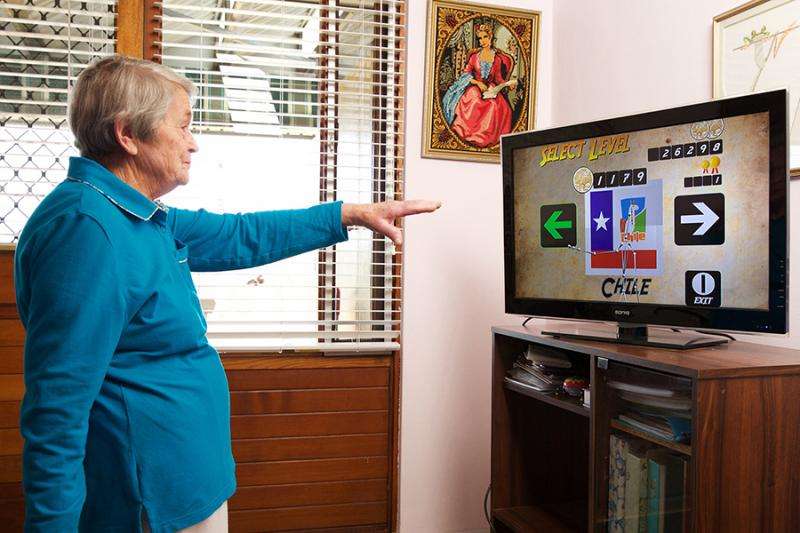Doreen Garrick enjoys the ‘fun and fitness’ benefits of Step Kinnection. Credit: Peter Morris
One in three Australians aged over 65 will have a fall this year. For an elderly person, as bones become brittle and balance less sure, a fall can cause such deterioration in their health that they may not recover.
While turning back the clock is not an option, researchers have turned to young people's gaming technology to help older people stay on their feet and remain fit and well.
A new game, Step Kinnection, is winning converts in Sydney retirement villages as residents employ a competitive spirit to improve their balance, gauge their progress and have a lot of fun "travelling the world".
"Because we know that increased physical activity can decrease falls by 40 per cent, we wanted to use cutting-edge technology and apply it to this health problem," says Karla Felix Navarro, a lecturer in the School of Computing and Communications at the University of Technology Sydney (UTS).
Though the role of physical activity in reducing falls is well known, many older people aren't good at sticking to an exercise regime. "We thought 'let's make it fun!' and so our game can be done at home and incorporate things they like, such as travel, music and … some fruits!" says Dr Felix Navarro.
Step Kinnection was created by PhD student Jaime Garcia. The starting technology is Microsoft Kinect, a relatively inexpensive off-the-shelf gaming device that can be plugged into a television or computer monitor, with a camera that tracks body movements in real-time 3D. Garcia and Dr Felix Navarro, his PhD supervisor, then generated their own software.
To play the game, a participant stands facing the camera, which ideally is positioned under the TV so it can calibrate the player's measurements and allow the software to create an avatar of the player.
The aim is for the participant to go on a virtual round-the-world holiday through 32 countries – moving from the easiest (China) to the most challenging (Colombia). The player must step quickly on fruits as they light up randomly on the screen; on screen the avatar's feet move with the player. This repeated action and a gradual increase in speed (as they collect more fruit, and move from country to country) improve the participant's stepping reaction time and balance, Dr Felix Navarro says.
In addition, the game continually measures the participant's performance through an in-built clinically validated mobility test. The data is stored in the cloud with secure access for participants and clinicians.
The researchers have already completed a feasibility study, taking their game to two retirement homes and to other elderly people living independently to see their reaction and monitor their progress. Over three months, they saw "noticeable improvements" in participants' health.
Doreen Garrick, 81, completed all levels of the game "with flying colours" and says it definitely helped her physically, supplementing a fitness routine that already included regular gym sessions.
"My reflexes were speedier, it was good for my concentration and it was fun – not boring like some research can be," says Garrick, who lives independently in a retirement village in Woollahra.
"I do suffer a bit with back problems but I forget that when I'm playing the games."
Garrick is a strong supporter of research in aged care and has participated in several projects over recent years: "I won't see the benefits but it might help someone later on."
The team is seeking funding to widen its research, with the aim of making the game commercially available. With more data about its effectiveness, says Dr Felix Navarro, the software could be developed to benefit the increasing numbers of elderly people around the world.
"The messages are easily translated. It relies mostly on imagery so the technology is very transferrable," she says.
Provided by University of Technology, Sydney























